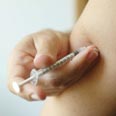
Breakthrough research offers sweet hope
Israeli team from Weizmann Institute of Science successfully cure type 1 diabetes in primates using transplanted pancreatic tissue from pig embryos to resume regular insulin production
Diabetes patients can draw hope from a new Israeli study conducted at the Weizmann Institute of Science. The research team successfully cured type 1 diabetes, also known as juvenile diabetes, in primate subjects by transplanting pancreatic cells from pig embryos.
"There is potential here for an unlimited source of pancreatic tissue for transplants," the researchers said.
Type 1 diabetes affects the pancreas and sufferers are unable to produce sufficient amounts of insulin, the hormone used to regulate sugar levels in the blood. Patients are required to test their blood sugar levels 4-8 times a day and inject themselves with insulin according to the results. As the disease is chronic, those afflicted must live with the unforgiving regimen their entire lives.
For years scientists the world over have been trying to find reliable 'spare parts' for human organs due to a shortage of donors. But while some research is being focused on artificial substitutes for ailing hearts, livers and spleens, others are looking to animals for the answers – namely pigs.
The Israeli team led by Professor Yair Reisner postulated that pancreatic cells created from embryonic tissue excised from fetal pigs could be used to replace diabetes-ravaged cells.
One of the main problems that the team faced was determining the precise stage of gestation that would provide optimal embryonic cells. In the new study, published in the Proceedings of the National Academy of Sciences of the United States (PNAS), the researchers took cells from 42-day old embryos and transplanted them in primates with diabetes.
At this stage of their development the embryos have enough partially differentiated pancreatic cells but retain their ability to grow into a new organ.
New pancreas - no insulin shots
The first pair of monkeys died shortly after the xenotransplant due to an infection caused by treatments intended to suppress their immune system so as to prevent the rejection of the foreign cells.The second pair however received a milder course of immunosuppressives and survived an entire year after the transplant. Five months after the procedure the monkeys indeed grew new pancreatic tissue and began producing independently – completely eliminating the need for artificial injections.
The researchers also confirmed that the insulin being produced by the monkeys were porcine, while the vessels making up the new organ was entirely the hosts'. According to Reisner this is a crucial development as it indicates that the primate's immune system did not attack the vessels.
However the second pair also eventually succumbed to complications brought on by the immunosuppressive drugs.
"We're fine-tuning things to reduce the levels of toxicity," Reisner says. "The important thing is that we set out to show that a pancreas could be grown this way, and that it could correct the uncontrolled glucose levels caused by diabetes, which is what we've done."










